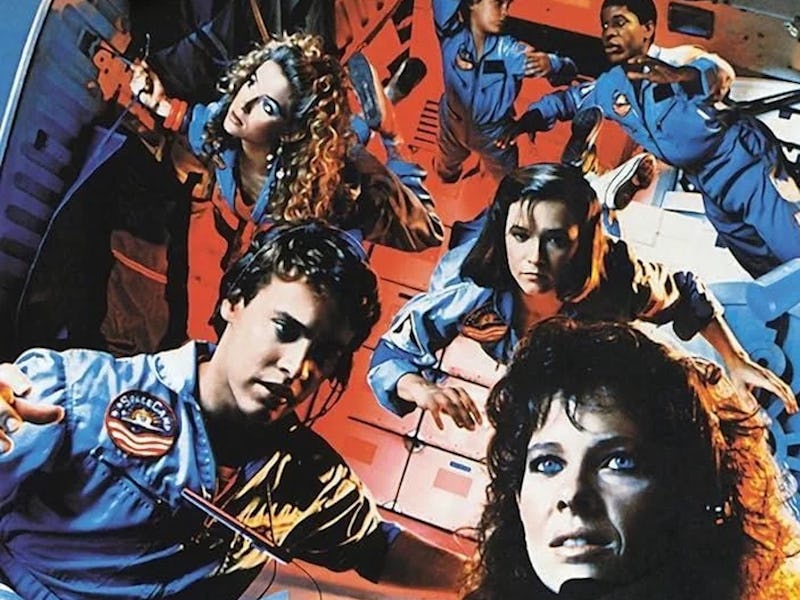Joaquin Phoenix’s True Masterpiece Is a Bizarre Sci-Fi Movie You’ve Never Seen
Time to relive an underrated Phoenix classic.

Regardless of how you feel about Joker: Folie à Deux, there’s no denying the raw talent of Joaquin Phoenix. From films like The Master to Her, and yes, Joker in 2019, Phoenix has a way of conveying various conflicting feelings at the same time, and utterly decimating audiences in the process. Whether or not he’s pulled that off with Joker: Folie à Deux is up for debate, but even when all of this purple smoke clears, we’ll all go see another Joaquin Phoenix film again. He’s just that good.
But beyond his famous movies, what was the first big movie that proved he could do anything? What was the Phoenix origin story, in terms of movie magic? Although his first feature film was a depressing 1985 TV movie called Kids Don’t Tell, his first true triumph was the sci-fi romp SpaceCamp in 1986. This overlooked film is no Joker: Folie à Deux, but, its bonkers premise did help launch the actor’s career and is worth a rewatch today — if you can find it.
Joaquin Phoenix was just 12 years old in 1986 when SpaceCamp premiered, and at the time still used the self-give name “Leaf.” Although he’d appeared on TV, this was his first major film role, and for kids of the ‘80s who saw it, Phoenix was 100% the audience surrogate of SpaceCamp.
The premise of the movie, briefly, is this: Max (Phoenix) is visiting SpaceCamp, and instantly becomes BFFs with a robot named Jinx (voice of Frank Welker). In the ‘80s, it seems that it was semi-mandatory for major studio films to have a cutesy/funny robot for comic relief, or, in this case, to actually make the plot happen. In an Asimovian moment of confusion, Jinx interprets Max’s wish to go to space as a literal request and figures out a way to send the young boy — along with teenagers Kathryn (Lea Thompson), Kevin (Tate Donovan), Rudy (Larry B. Scott), and Tish (Kelly Preston) — on the space shuttle Atlantis for a legitimate launch.
The movie then follows four teens and one tween who are accidentally trapped in space and have to figure out a way to come together in a quasi-Breakfast Club way while overcoming the odds. As Max, Phoenix is the defacto hero of the movie, and not just because he’s the only actual kid in the film. In the third act, there’s one point where grabbing extra oxygen canisters requires exiting the spacecraft, which (of course) only Max can reach because of his size. Throughout the film, Max cracks Star Wars references, making him, possibly, the first character in a major movie who grew up with the very first Star Wars film, which, at that point, wasn’t even a decade old. When Max gets nervous, Kevin becomes his Obi-Wan, and SpaceCamp literally just rips off Star Wars — Max is told to “use the Force,” which allows him to calm down and save the day.
The cast of SpaceCamp: a very young Joaquin Phoenix, Tate Donovan, Kate Capshaw, Lea Thompson, Kelly Preston, and Larry B. Scott.
This unapologetic homage to Star Wars was, arguably, risky at the time. Could anyone have known the reference would still make sense decades later? But strangely, the reason SpaceCamp is largely forgotten has little to do with any of its ‘80s out-datedness. Instead, it’s because the movie was filmed before the Challenger explosion of 1986, but released afterward. In essence, Joaquin Phoenix’s first big movie was at the center of a massive optics problem. Who was going to go see a silly teen movie about a space shuttle accident when real people had just perished in an actual space shuttle?
In the end, SpaceCamp earned less than 10 million dollars upon release and received mixed reviews. But as the years went on, the film earned a kind of cult status, probably from ‘90s kids who watched the film on cable or VHS. A reboot was announced in 2020, though, as of yet, that new SpaceCamp hasn’t launched. Maybe if Joaquin Phoenix appeared as Max in a SpaceCamp reboot it would help get the project off the ground. Who knows, after Joker: Folie à Deu, maybe Phoenix is ready to return to space.